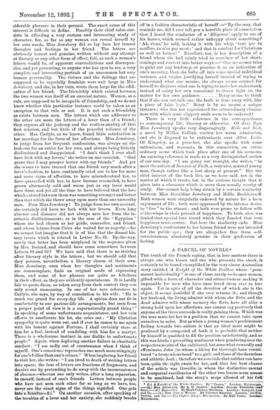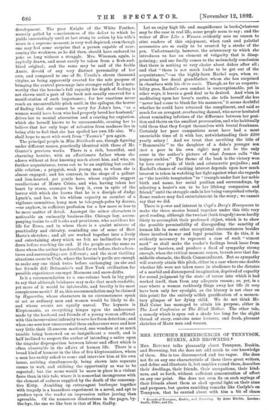A PARCEL OF NOVELS.*
THE truth of the French saying, that in love matters there is always one who kisses and one who presents the cheek, is certainly to be found exemplified in the very clever Australian story entitled 'A Knight of the White Feather, whose "para- mount individuality" is one of those rarely-to-be-met women, gifted with a force of character and attractiveness making it impossible for men who have once loved them ever to love again. Yet in spite of all the devotion of which she is the object, it seems doubtful if she ever returns it; and though her husband, the living admirer with whom she flirts, and the dead admirer with whose memory she flirts, have all alike a strong hold upon her affections, one cannot say positively that anyone of the three succeeds in really gaining them. Which was the true mate for her is a problem that we cannot take upon ourselves to solve. But as when a young woman's predominant feeling towards two suitors is that an ideal mate might be produced by a compound of both, it is probable that neither by himself is qualified to fill the position satisfactorily, and as this was Linda's prevailing sentiment when pondering over the respective merits of the cultivated, but somewhat cowardly and effeminate, John (to whom a liking for thorough-bass, consti- tuted "a tremendous bond" to a girl), and those of the dauntless and athletic Jack ; therefore we conclude that neither can have been quite the right swain for her, and that her best chance` of the article was Greville, in whom the distinctive mental and corporeal excellencies of the other two lovers seem meanti to be oombined,Jiad. the story's scope allowed, of his fulls • (1.) A Knight o,f the White Feather. " Terme." London: Heinemann. d1r- A: a,. Gunter.- Lopatin:: .Geoege 'llettitabigovidffi Hypocrite.. By HughColeman Davidson. Loudon: Sampson Low and 0o.—(4.) Row J,ike a Woman B klorence Marryat. London: Griffith, Ferran, and Co.—(5.) Capt'n Vary's honeymoon. By Hall Caine. London' Heinemann.
development. The poor Knight of the White Feather, secretly galled by consciousness of the defect to which he yields unresistingly until at last stung to action by his wife's scorn in a supreme moment, is very well depicted, even though one may feel some surprise that a person capable of over- coming the weakness, as he did then, should have endured its yoke so long without a struggle. Mrs. Wiseman, again, is capitally drawn, and must surely be taken from a flesh-and- blood original; and the same may be said of the feeble Annie, devoid of any very distinct personality of her own, and compared to one of St. Ursula's eleven thousand virgins, as being apparently created for the sole purpose of bringing the central personage into stronger relief. It is note- worthy that the heroine's full capacity for depth of feeling is not shown until a part of the book not usually reserved for a manifestation of such importance ; for her emotions never reach an uncontrollable pitch until, in the epilogue, the horror of finding that she cannot be sorry for John's loss, as a woman would have been who had properly loved her husband," drives her to mental aberration and a craving for expiation, which she herself knows to be unreasonable, causing her to believe that her only hope of salvation from madness lies in being able to feel that she has spoiled her own life also. We shall hope to meet with work from " Tasma's " pen again.
The principal people in Miss Dividends are, though figuring under different names, practically identical with those of Mr. Gunter's previous works. There is a rich, beautiful, and charming heroine, with an affectionate father whom she adores without at first knowing much about him, and who, on further acquaintance, turns out to be an anything but credit- able relation ; a priggish, weak young man, to whom she is almost engaged ; and his contrast, in the shape of a gallant and lion-hearted, yet gentle hero, whose exploits suggest recollections of Monte Cristo, and who, having taken her heart by storm, manages to keep it, even in spite of the horror with which she learns that he is a disciple of Judge Lynch's, and has, in his whilom capacity as member of a vigilance committee, hung men to telegraph-poles by dozens, —or anyhow, in sufficient profusion for a few more or less to be mere matter of detail. Amongst the minor characters is noticeable an eminently business-like Chicago boy, accom- panying trains to sell books and provisions, who sacrifices his life for Erma, and in whom there is a quaint mixture of practicality and chivalry, reminding one of some of Bret Harte's sketches ; and all are worked together into a lively and entertaining story which we felt no inclination to put down before reaching the end. If the people are the same as those whom the author has described for us before, their adven- tures and surroundings are different ; and the most thrilling situations occur in Utah, where the heroine's perils are enough to make any one think twice before exchanging (as she and her friends did) Delmonieo's and New York civilisation for possible experiences amongst Mormons and snow-drifts.
Is it a recommendation to a one-volume book in big print to say that although briskness may make that much readable, yet more of it would be intolerable, and brevity is its most conspicuous merit? If so, this recommendation may be claimed by Hypocrites, whose characters in no circumstances speak or act as ordinary men and women would be likely to do, and whose events are equally unreal. The keynote is Kleptomania, as everything hinges upon the endeavours made by the husband and friends of a young woman afflicted with this inconvenient infirmity to save her from detection; and when one sees how unsuccessful these endeavours were and how very little their ill-success mattered, one wonders at so much trouble being bestowed on so insignificant a result, and is half inclined to suspect the author of intending a satire upon the singular disproportion between labour and effect which is often observable in the affairs of human life. There is a broad kind of humour in the idea of five kleptomaniacs, whom a man has rashly asked to come and interview him at his own house, arriving simultaneously, being shown into separate rooms to wait, and utilising the opportunity as was to be expected ; but the scene would be more in place in a violent farce than in this tale, where it is somewhat incongruous with the element of sadness supplied by the death of the consump- tive Kitty. Jumbling up extravagant burlesque together with tragedy is a hazardous experiment in a novel, and apt to prodace upon the reader an impression rather jarring than agreeable. Of the numerous illustrations in the pages, by- the-bye, the one we like best is that of Mrs. Gadby. Let us enjoy high life and magnificence in books:whatever may be the case in real life, some people seem to say; and the writer of How Like a Woman evidently sees no reason to stint readers of this enjoyment, when rank and palatial accessories are so easily to be created by a stroke of the pen. Unfortunately, however, the aristocracy to which she introduces us has an element of vulgarity that is disap- pointing; and one finally comes to the melancholy conclusion that there is nothing so very choice about dukes after all ; and that "there is not much kudos to be got out of the acquaintance,"—as the highly-born Rachel says, when re- proaching her ducal grandfather, whom she has surprised in chambers with his chere antic. Though, as far as respecta- bility goes, Rachel's own conduct is unexceptionable, yet in other ways, it leaves a good deal to be desired. And when in meditating upon her lover's merits, she tells herself she has "never had cause to blush for his manners," it seems doubtful whether he could have returned the compliment, and said as much for an arrogant, overbearing damsel, who never hesitated about reminding inferiors of the difference between her posi- tion and theirs on the smallest provocation, and who habitually told them that they forgot themselves with brutal frankness. Certainly her poor companions must have had a most unenviable time of it with her, notwithstanding their 2200 yearly salary ! And we trust that ascribing the title of " Honourable " to the daughter of a duke's younger son (not a peer in his own right) may not be the only error in the author's picture of what Jeames calls "the hupper suckles." The theme of the book is the victory won by love over pride of birth and aristocratic prejudice ; and Rachel's chance of exciting interest depends upon how much interest is taken in watching her fight against what she regards. as "the terrible temptation "to "trample under foot her noble birth and name, her social position and surroundings, by selecting a hosier's son to be her lifelong companion and friend," until the struggle ends in her being vanquished utterly. Some readers may find entertainment in the story ; we cannot say that we did.
There is power and interest in Capen Davy's Honeymoon to make the three stories bound together under this title very good reading, although the two last (both tragedy) seem hardly likely to accomplish their professed object, which is to show the possible permissibility of disregarding the sanctity of human life in some other exceptional circumstances besides those involved in war and legal penalties. To do this, it is evidently necessary to represent a case of such "utmost need" as shall make the reader's feelings break loose from ordinary barriers, and produce a flood of sympathy strong enough, when the critical moment comes, to rush over that for- midable obstacle, the Sixth Commandment. But as sympathy will scarcely attain this pitch, either in a case where one doubts whether life were not taken more in obedience to the dictates- of a morbid and distempered imagination, deprived of capacity for sound judgment by the state of terror into which it had worked itself, than from any adequate reason ; or, yet, in a. case where a woman recklessly flings away her life (it may, have been only her eyesight, as the history is not clear on this point) for the entirely selfish gratification of a momen- tary glimpse of her dying child. We do not think Mr. Hall Caine has managed to attain his purpose, either in The Last Confession or The Blind Mother. The other tale, a comedy which is spun out a shade too long for the slight thread of story, contains some humour, and fresh, pleasant sketches of Manx men and women.







































 Previous page
Previous page